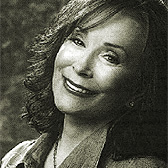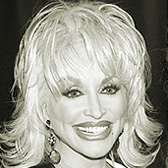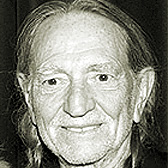
The Original "Coal Miners Daughter"
Loretta Lynn
InducteeSixty-year career capped by Presidential Medal of Freedon from Obama
Loretta Lynn's songs fashioned a body of work that has confronted many of the major social issues of her time, and her life story is a rags-to-riches tale familiar to pop, rock and country fans alike. Coal Miner's Daughter refers to a hit single, an album, a best-selling autobiography, an Oscar-winning film, and to Lynn herself who journeyed from the poverty of the Kentucky hills to Nashville, one of the first women to rise to superstardom as a country vocalist and as an American icon.
Lynn was born in Butcher Holler, Kentucky. Just as she would later sing in "Coal Miner's Daughter," Loretta's family eked out a living during the Depression on the "poor man's dollar" her father managed to earn "working all night in the Van Lear coal mine and all day long in the field a-hoein' corn." As she also notes in that song, "I never thought of leavin' Butcher Holler." But that was before she met Oliver Lynn (aka Doolittle or Doo or "Mooney" for moonshine), a handsome 21-year-old fresh from the service who swept the young Loretta Webb off her feet. The couple married when Loretta was barely 14. Looking for a future that didn't require him to work the mines, Doo found work in Custer, Washington, and Loretta joined him in 1951.
The following decade found Lynn a fulltime mother. In her spare time, with Doo's encouragement, she learned to play the guitar and began singing in the area. During one televised talent contest in Tacoma hosted by Buck Owens, Loretta was spotted by Norm Burley who was so impressed he started Zero Records just to record her, and Lynn soon fashioned her distinctive style, a mature fusion of twang, grit, energy and libido.
Unlike many of her contemporaries, Lynn wrote a great deal of her material, beginning with her first chart hit, 1960’s “I’m a Honky Tonk Girl.” Beyond her pointed songs that addressed traditional honky-tonk themes like infidelity and divorce from the woman’s point of view (a rarity in country), she penned numbers that fearlessly essayed contemporary topics ranging from the Vietnam War to contraception.
She wrote a string of hits unprecedented for their take-no-crap women narrators. In "You Ain't Woman Enough (to Take My Man)" [#2, 1966], "Don't Come Home A Drinkin' (with Lovin' on Your Mind)" [#1, 1967], and "Fist City" [#1, 1968], among others, Loretta presented a new character on the country scene: a woman unafraid to stand up for herself. The immense popularity of these songs, as well as other straight shooting hits like "Your Squaw Is on the Warpath," "Women of the World (Leave My World Alone)" and "You're Looking at Country," culminated in 1972 when Lynn won her second Best Female Vocalist award from the Country Music Association, and when she became the first woman to win the CMA's most prestigious award, Entertainer of the Year.
She dominated the charts in the 1960s and '70s (when she was second only to Dolly Parton), ringing up 11 No. 1 country hits in her own right and another five chart-toppers with Conway Twitty. In all, she charted 51 top-10 country singles.
With Twitty, there were 14 chart singles together included a run of five No. 1 duets in 1971-75: “After the Fire Is Gone” (a Grammy winner for best country duo/group performance), “Lead Me On,” “Louisiana Woman, Mississippi Man,” “As Soon as I Hang Up the Phone” and “Feelin’s.” Loretta won her first Vocal Duo of the Year award in 1972, with Twitty, a title the team held onto through 1976. Through the next decade, Lynn continued to score as a solo artist with memorable singles like the divorce-themed “Rated ‘X" (No. 1, 1972), the controversial look at birth control “The Pill” (No. 5, 1975) and “She’s Got You” (a cover of the Patsy Cline hit) and “Out of My Head and Back in My Bed,” both of which reached No. 1 in 1977.
“Coal Miner’s Daughter” was the autobiographical song that gave her memoir its title, reaching No. 1 in 1970, and her longest-running hit, “One’s On the Way” (No. 1 for 16 weeks) followed a year later. The critical and popular success of “Coal Miner’s Daughter” helped elevate her to legend status, and she logged her last top 10 single, “I Lie,” in 1982.
Lynn’s hard-edged top-10 entries also included “Before I’m Over You” (No. 4, 1963), “Wine Women and Song” and “Happy Birthday” (both No. 3, 1964) and the autobiographical “Blue Kentucky Girl” (No. 7, 1965, and a No. 6 cover hit in 1979 for Emmylou Harris). She was also memorably paired with her idol, Texas honky tonker Ernest Tubb, in a series of early singles, and she teamed with fellow stars Dolly Parton and Tammy Wynette for the Columbia album Honky Tonk Angels in 1993.
Lynn busied herself as a live performer, also operating a studio and museum at her Hurricane Mills, Tennessee home and sponsored an annual championship motocross race. In the early ’90s, she reined in her concert schedule to care for her ailing husband who died in August 1996; the couple had been married for 48 years.
She began the new millennium with an album, Still Country, for the Nashville independent Audium Records. However, it wasn’t until she teamed with longtime admirer Jack White in 2004 at age 72 that she gained new attention and fresh respect. Sporting 13 new songs either written or co-written by Lynn, Van Lear Rose collected a Grammy in 2005 as best country album, while its single “Portland Oregon” drew the best country collaboration award for Lynn and White.
Lynn was inducted into the Country Music Hall of Fame in 1988 and was a Kennedy Center Honoree in 2003. She received Lifetime Achievement Award recognition from the Recording Academy in 2010.
Lynn’s late-career revival continued with the 2016 album Full Circle, co-produced by her daughter Patsy Lynn Russell and John Carter Cash, son of Johnny Cash; it included duets with Elvis Costello and Willie Nelson. Other new albums followed, including White Christmas Blue (also in 2016), Wouldn’t It Be Great (2018) and the final new album released during her lifetime, Still Woman Enough, which featured vocal collaborations with Tanya Tucker, Margo Price, Reba McEntire and Carrie Underwood on remakes of some of her oldies along with some newer compositions. Still Woman Enough shares a title with a second autobiography she released in 2002.
Lynn is survived by three daughters and a son.
Scroll to Discover Loretta Lynn Connections






